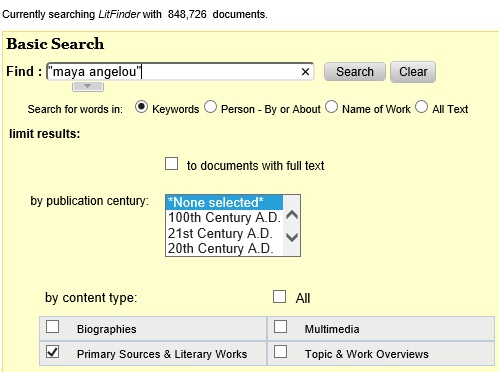If you’ve been following this blog, you know we’ve been examining how to do in-depth research in each of the major academic disciplines IU East offers. There’s a lot that is the same for any type of scholarly research, and we started off looking at those general techniques. But every field of study has its own, unique needs, and to be a great researcher, you need to learn them. This week, we’ll look at English and literature.
Obviously, we have a lot of great general purpose databases for locating research articles – some of these include MLA International Bibliography and ProQuest Language and Literature. But another great source is JSTOR, a database that has journal articles dating back more than a century. Unlike research for a topic like medicine or science, this is a good thing. Currency is nowhere near as important in the study of English or of literature as it is in some other disciplines. A book or article even forty years old might be considered current, and those authors’ insights will be very useful to you. All of our databases dealing with the study of literature or English can be found here.
So, let’s say we were researching a topic like “What kinds of Christian symbolism did Ben Jonson use in his plays?” Putting the basic techniques we learned into practice, we might try a search like this:
jonson AND (religio* OR christ*) AND (theat* OR play* OR comed* OR traged*)
Notice how we’ve structured the search – we’re looking for three main concepts (grouped in parentheses), and are looking simultaneously for synonyms for those concepts. A search like this will give us a lot more of what we need, and a lot less of what we don’t, than just typing ‘ben jonson’ and hoping for the best.
But, of course, literature and English have their own unique characteristics that set them apart from other disciplines. Learning how to do good research in these areas will make you a much better student of English. Fortunately, we have plenty of tools at your disposal.
ENGLISH LANGUAGE
The very nature of language plays a role in study, in a way that other disciplines don’t grapple with. What does a word mean? How is it being used? Was its meaning different to the author than it is to us? These are all questions that can help us understand a text or work of literature. For some, a common dictionary would suffice. But for a scholar, no source equals the Oxford English Dictionary. The OED is a complete (and very thorough – the hard copy is well over twenty thousand pages long) dictionary, with normal definitions, pronunciation guides, and related words. But it traces the development of the English language, too, showing how words entered English, what language they entered from, and how their usage and spelling changed over time. It can be useful for dating an unknown text – is the language it uses contemporary? It can be helpful for a writer, as well – if you are writing your own fiction, it can help you match your dialogue to the era. Our extensive book and ebook collections contain numerous titles to help in the formal study of the English language as well, such as Ronald Carter’s Investigating English Discourse: Language, Literacy, Literature or M.A.K. Halliday’s Studies in English.
LITERARY CRITICISM
In examining a work of literature, it will often be put to interpretive criticism. More than merely reviewing books, literary criticism interprets and evaluates the work in a variety of modern and historical contexts, such as a feminist or Marxist worldview. Some criticism can be quite lengthy, examining a whole author’s corpus of work, or a particular literary movement. Books and ebooks are the best sources for these sorts of criticism, and our collection includes titles like Studies in Literary Criticism and Theory and Twentieth Century Fiction: From Text to Context. But for shorter critical writings, we have several databases entirely dedicated to the topic, including Literature Criticism Online and Literature Resource Center.
AUTHOR BIOGRAPHY
Learning about the author of a piece of literature can offer deep insight into what and why they wrote. Unlike disciplines like science and medicine, where the author tries to remove their own individual quirks from their writing, these personal characteristics instead deepen and enrich literature. We have numerous databases dedicated to this sort of study, including Contemporary Authors, Dictionary of Literary Biography Complete Online, and Something About The Author Online. And again, books and ebooks can lend insight to hundreds of writers – a few samples include A Companion to William Faulkner and Mark Twain: A Short Introduction.
AREA STUDIES
Where a book was written, and by whom, gives cultural context to works of literature, as well. As you might expect, we have lots of top-tier resources for examining these issues, too. A sampling of the many databases we have that serve cultural literature study include Black Women Writers, Caribbean Literature, Early English Prose Fiction, Scottish Women Poets of the Romantic Period, Latino Literature: Poetry, Drama, and Fiction, and 20th Century American Poetry. Our books and ebooks run the gamut, as well, with such titles as New Spain, New Literatures and The Literature of Ireland: Culture and Criticism.
PRIMARY SOURCES
Primary sources are anything written directly by a participant, rather than information that comes second-hand from interviewing or research. They can include letters, diaries, personal notes, oral histories, and more. Databases like Literature Resource Center and Litfinder allow you to limit a search to only primary materials like this, and other databases like British and Irish Women’s Letters and Diaries reflect the personal stories of types of authors that can be underrepresented in more general works.
With all of these tools, doing research on literature or English topics will be much easier for you. But if you have any questions, please contact us at iueref@iue.edu!



